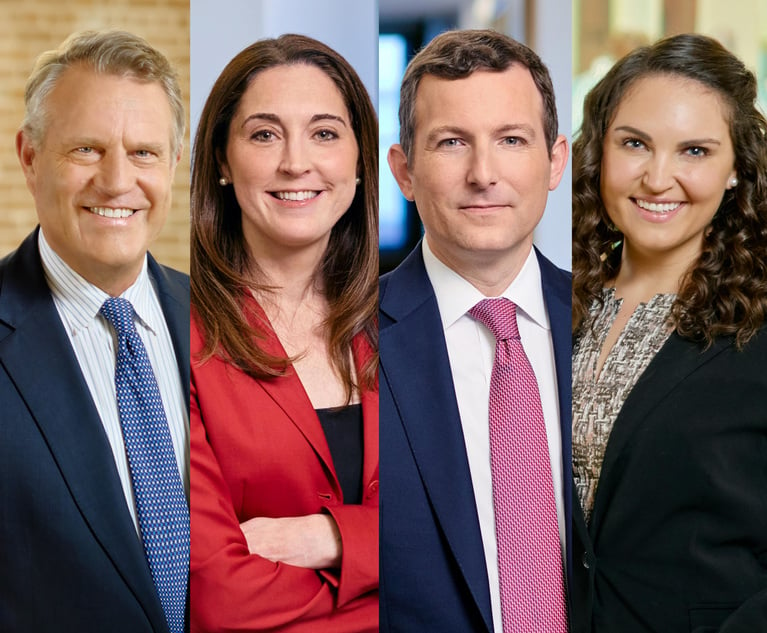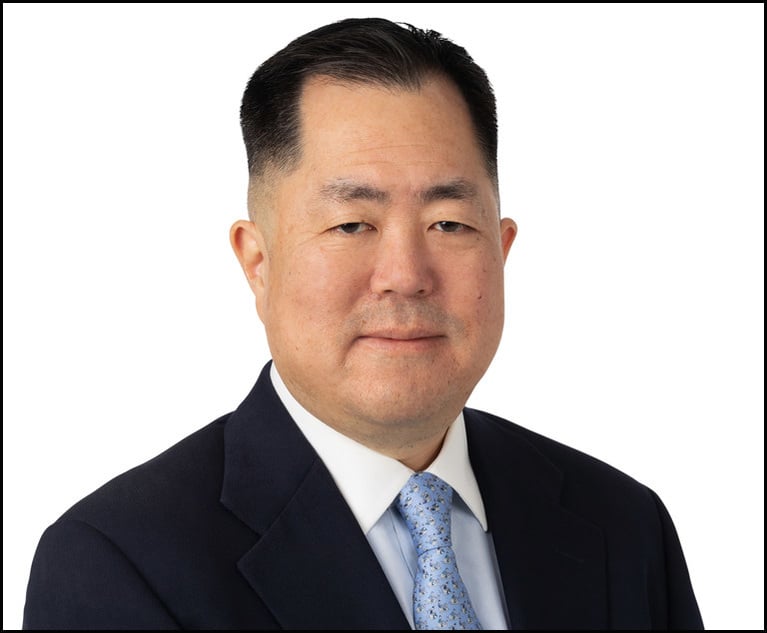 Uber car.
Uber car.Alsup Certifies a Class of Uber Drivers in Suit Over Fees
U.S. District Judge William Alsup of the Northern District of California certified a class of Uber drivers Wednesday in a case claiming the company takes an oversized chunk of ride fees.
February 15, 2018 at 01:34 PM
3 minute read
SAN FRANCISCO — The federal judge who oversaw Uber's trade secrets trial showdown with driverless car rival Waymo has certified a class of Uber drivers in a separate case claiming the company takes an oversized chunk of the fees charged to passengers.
U.S. District Judge William Alsup of the Northern District of California, who called Waymo v. Uber “ancient history” during a hearing where the parties announced a settlement last week, issued an order Wednesday evening certifying a class in the driver suit, Dulberg v. Uber Technologies. Alsup's class certification order currently remains under seal, but the judge publicly filed a notice of the factors he'll take into account upon reviewing any proposed class settlement in the case.
An Uber spokesman declined to comment on the decision Thursday morning.
Lawyers from the El Segundo and New York City offices of Napoli Shkolnik sued Uber in February 2017 on behalf of North Carolina Uber driver Martin Dulberg, claiming the company continues to pay drivers based on actual ride times and distances even though it moved to an “upfront” pricing model in autumn 2016 that charges passengers based on estimated ride lengths, which tend to be longer. According to the complaint, the new pricing model means Uber has kept a higher percentage of the overall charges to passengers in violation of its contractual agreement with drivers.
Uber's defense lawyers O'Melveny & Myers, who subbed into the case for counsel at Coblentz Patch Duffy & Bass since Alsup denied the company's motion to dismiss, argued in their opposition to class certification that the case was unfit for class treatment. The O'Melveny lawyers argued that determining whether any particular driver would benefit from calculating their portion of the fee from the “upfront” price would be “an individualized issue dependent on his or her unique driving history.”
But Alsup agreed with the plaintiffs who argued in their brief that the case was “tailor-made for class certification” since it involved an alleged breach of a form contract between Uber and all of its drivers.
Paul Maslo, a partner in Napoli Shkolnik's New York office who is leading the plaintiff's case, said Alsup's ruling “is significant because it allows the named plaintiff to prosecute this case on behalf of drivers throughout the country.”
This content has been archived. It is available through our partners, LexisNexis® and Bloomberg Law.
To view this content, please continue to their sites.
Not a Lexis Subscriber?
Subscribe Now
Not a Bloomberg Law Subscriber?
Subscribe Now
NOT FOR REPRINT
© 2025 ALM Global, LLC, All Rights Reserved. Request academic re-use from www.copyright.com. All other uses, submit a request to [email protected]. For more information visit Asset & Logo Licensing.
You Might Like
View All
Apple Disputes 'Efforts to Manufacture' Imaging Sensor Claims Against iPhone 15 Technology

'Another Broken Promise': California Tribes Sue Casinos for Allegedly Illegal Profit From Card Games

After Solving Problems for Presidents, Ron Klain Now Applying Legal Prowess to Helping Airbnb Overturn NYC Ban
7 minute read
Husch Blackwell Hires Former Adobe Counsel to Oversee AI Advisory Offering
3 minute readTrending Stories
- 1What to Know About the New 'Overlapping Directorship' Antitrust Development
- 2'Quiet, Appropriate End:' NY Court of Appeals Formally Removes Erin Gall From Bench
- 3Just One Cookie? Justices to Decide Liability for Half-Truths
- 440% Contingency: A New Ruling Just Cost This Plaintiff Team $827K in Legal Fees
- 5Runners-Up and Shout-Outs for Litigator of the Week
Who Got The Work
Michael G. Bongiorno, Andrew Scott Dulberg and Elizabeth E. Driscoll from Wilmer Cutler Pickering Hale and Dorr have stepped in to represent Symbotic Inc., an A.I.-enabled technology platform that focuses on increasing supply chain efficiency, and other defendants in a pending shareholder derivative lawsuit. The case, filed Oct. 2 in Massachusetts District Court by the Brown Law Firm on behalf of Stephen Austen, accuses certain officers and directors of misleading investors in regard to Symbotic's potential for margin growth by failing to disclose that the company was not equipped to timely deploy its systems or manage expenses through project delays. The case, assigned to U.S. District Judge Nathaniel M. Gorton, is 1:24-cv-12522, Austen v. Cohen et al.
Who Got The Work
Edmund Polubinski and Marie Killmond of Davis Polk & Wardwell have entered appearances for data platform software development company MongoDB and other defendants in a pending shareholder derivative lawsuit. The action, filed Oct. 7 in New York Southern District Court by the Brown Law Firm, accuses the company's directors and/or officers of falsely expressing confidence in the company’s restructuring of its sales incentive plan and downplaying the severity of decreases in its upfront commitments. The case is 1:24-cv-07594, Roy v. Ittycheria et al.
Who Got The Work
Amy O. Bruchs and Kurt F. Ellison of Michael Best & Friedrich have entered appearances for Epic Systems Corp. in a pending employment discrimination lawsuit. The suit was filed Sept. 7 in Wisconsin Western District Court by Levine Eisberner LLC and Siri & Glimstad on behalf of a project manager who claims that he was wrongfully terminated after applying for a religious exemption to the defendant's COVID-19 vaccine mandate. The case, assigned to U.S. Magistrate Judge Anita Marie Boor, is 3:24-cv-00630, Secker, Nathan v. Epic Systems Corporation.
Who Got The Work
David X. Sullivan, Thomas J. Finn and Gregory A. Hall from McCarter & English have entered appearances for Sunrun Installation Services in a pending civil rights lawsuit. The complaint was filed Sept. 4 in Connecticut District Court by attorney Robert M. Berke on behalf of former employee George Edward Steins, who was arrested and charged with employing an unregistered home improvement salesperson. The complaint alleges that had Sunrun informed the Connecticut Department of Consumer Protection that the plaintiff's employment had ended in 2017 and that he no longer held Sunrun's home improvement contractor license, he would not have been hit with charges, which were dismissed in May 2024. The case, assigned to U.S. District Judge Jeffrey A. Meyer, is 3:24-cv-01423, Steins v. Sunrun, Inc. et al.
Who Got The Work
Greenberg Traurig shareholder Joshua L. Raskin has entered an appearance for boohoo.com UK Ltd. in a pending patent infringement lawsuit. The suit, filed Sept. 3 in Texas Eastern District Court by Rozier Hardt McDonough on behalf of Alto Dynamics, asserts five patents related to an online shopping platform. The case, assigned to U.S. District Judge Rodney Gilstrap, is 2:24-cv-00719, Alto Dynamics, LLC v. boohoo.com UK Limited.
Featured Firms
Law Offices of Gary Martin Hays & Associates, P.C.
(470) 294-1674
Law Offices of Mark E. Salomone
(857) 444-6468
Smith & Hassler
(713) 739-1250






